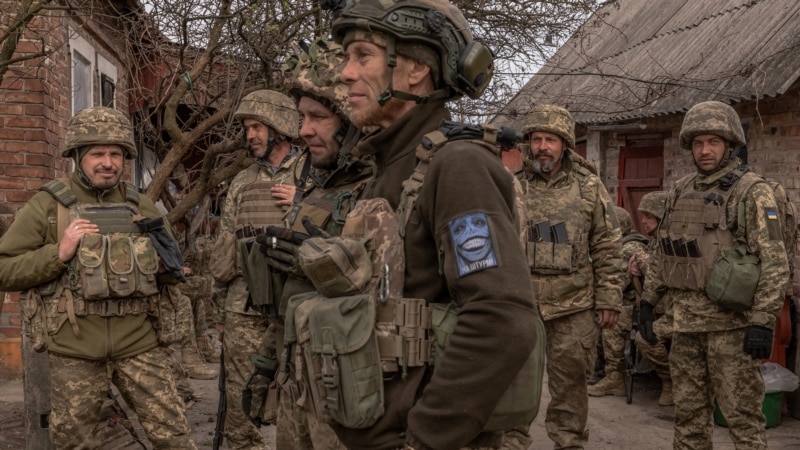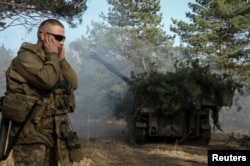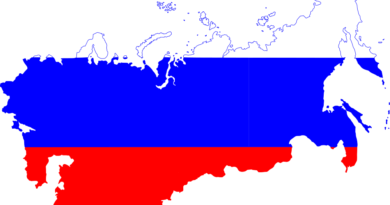Russia’s spy agency baselessly claims DEA and FBI enlist Mexican and Colombian drug cartels to fight for Ukraine
Russia has been using “predatory” recruitment methods to coerce thousands of convicts from prisons across the country to serve on the front lines in Ukraine. That helped prevent the need for domestic mobilization ahead of President Vladimir Putin’s reelection in March, Reuters and others reported last October.
With the war now in its third year, Ukraine is struggling to fill its personnel shortages as its fighting force is dwarfed by Russia’s.
Moscow is using Ukraine’s shortage of troops as ammunition in its hybrid warfare, which includes inventing and spreading conspiracy theories designed to undermine Ukraine and its allies, with the United States being the most frequent target.
In a recent example of such disinformation, on April 9, Russia’s Foreign Intelligence Service, or SVR, baselessly alleged that U.S. law enforcement agencies are recruiting imprisoned members of Mexican and Colombian drug cartels to fight in Ukraine.
“American private military companies, under the guidance of the Drug Enforcement Administration and the FBI, have begun to recruit Mexican and Colombian drug cartels’ members, who are serving their sentence in American prisons, to take part in the Ukrainian conflict on the side of Kyiv’s degrading regime,” the SVR said in a press statement.
The SVR alleged the “first group of cutthroats” would be deployed to Ukraine this summer, adding they had been “promised full amnesty” after the combat service.
The SVR also said the recruitment process “is not going on smoothly,” as the U.S. has to negotiate with “drug lords” to secure their permission for the convicts to “collaborate with American authorities.”
These claims are unsubstantiated.
The SVR provided no details or facts to support its allegations.
Polygraph.info found no reports in Russian and Western news outlets or by the rights and drug trafficking watch groups to back up the SVR’s statement. There are also no reports about the U.S. government agencies asking drug lords for permission to send their men to the front line in Ukraine.
The FBI and DEA declined to comment on the allegations.
Russia’s embassy in Mexico shared the unsupported claim, prompting this response from the U.S. Embassy in Mexico:
“Como dicen por ahí, la calumnia cuando no mancha, tizna,” which roughly translates to: “As they say out there, libel, when it does not stain, it smears.”
Mexican President Andrés Manuel López Obrador has repeatedly used that phrase to brush off accusations of malfeasance he considers libelous.
Contrary to SVR’s unfounded allegations against the U.S., Russia’s state-backed campaign to enlist criminals and foreigners to fight in Ukraine is well-documented.
That included allowing Yevgeny Prigozhin, the now-deceased head of the Russian private military company Wagner Group, to recruit tens of thousands of Russian prisoners to fight as mercenaries in Ukraine.
Those who survived were initially granted amnesty after six months, with some men coming home to recommit violent crimes in Russia.
In September 2022, a video emerged of Prigozhin personally recruiting inmates in a Russian prison colony in exchange for amnesty, even though Russian law does not allow commutation of prison sentences in exchange for mercenary service, the BBC reported.
Foreign nationals imprisoned on drug charges were also recruited by Wagner.
In June 2023, Reuters reported on three African inmates who had taken up Wagner’s offer of a pardon in return for a six-month service in Ukraine. Two of the three men died in combat.
Russia’s Ministry of Defense has also recruited prisoners to fight in so-called “Storm-Z detachments,” where they are reportedly treated as cannon fodder (expendable).
In September 2023, Olga Romanova, who heads the prisoner rights organization Russia Behind Bars, told VOA’s sister organization Radio Free Europe/Radio Liberty (RFE/RL), that Prigozhin had “tapped into a bottomless reservoir of mercenaries … because Russian prisons are some of the most horrible places on Earth.”
In January, Romanova alleged Russian prison authorities were turning off heat to further compel inmates to fight in Ukraine, an allegation Russia’s Federal Penitentiary Service denied.
Reports indicate Russia has sent more than 100,000 convicts to fight in Ukraine. Now, rather than being sent home after six months, Russian authorities are reportedly forcing those convict fighters to remain deployed until the war ends.
Russia is also reportedly targeting and coercing Central Asian migrants to enlist.
Additionally, Russia has recruited and allegedly tricked foreign nationals from Cuba, Nepal, India, and Africa to take up arms.
Some were offered the promise of a better life.
For example, many of the thousands of Nepalese fighters believed to have been recruited to fight on Russia’s side in the war were offered money and a fast-tracked path to Russian citizenship.
Speaking with CNN, some recruits claimed they did not support Russia’s invasion of Ukraine.
Others claim they never agreed to fight at all.
Several recent reports suggest Indian nationals have experienced extreme duress after being coerced, and even forced, to fight on Russia’s side in Ukraine.
Sky News recently reported that Indian nationals who traveled to Russia on tourist visas hoping to find work were arrested by Russian authorities and threatened with 10-year jail sentences for violating visa laws. Those men were told that to avoid prison, they had to serve one year in the Russian military.
Other Indian nationals speaking with the BBC said they had taken up what they believed were jobs to be security guards in Russia, only to be sent into combat.
They spoke of harrowing conditions on the front lines.
Polygraph.info previously debunked the unsubstantiated claim, spread by Russian and sympathetic social media users, that the U.S. and other NATO allies are sending mercenaries to Ukraine.




